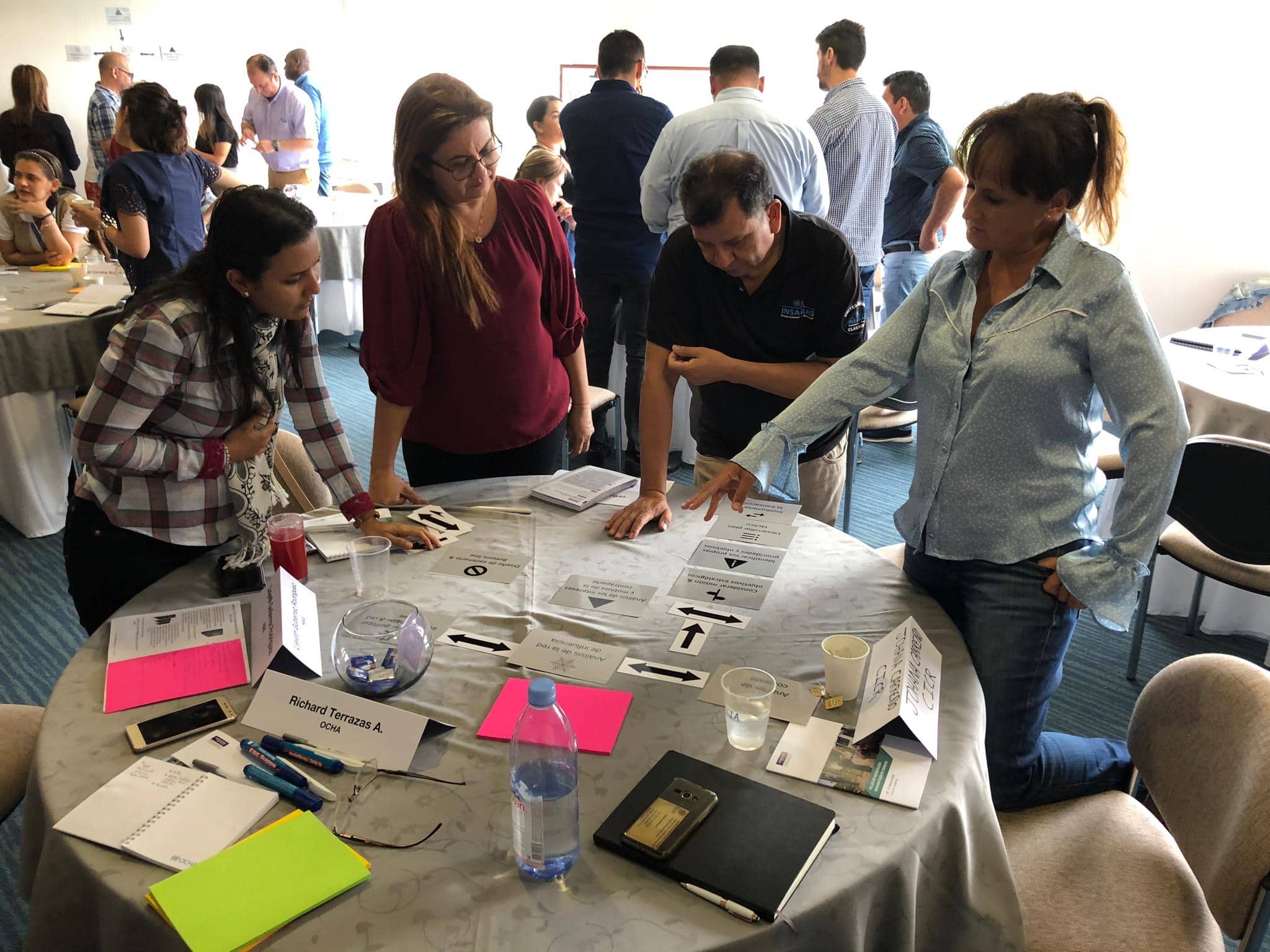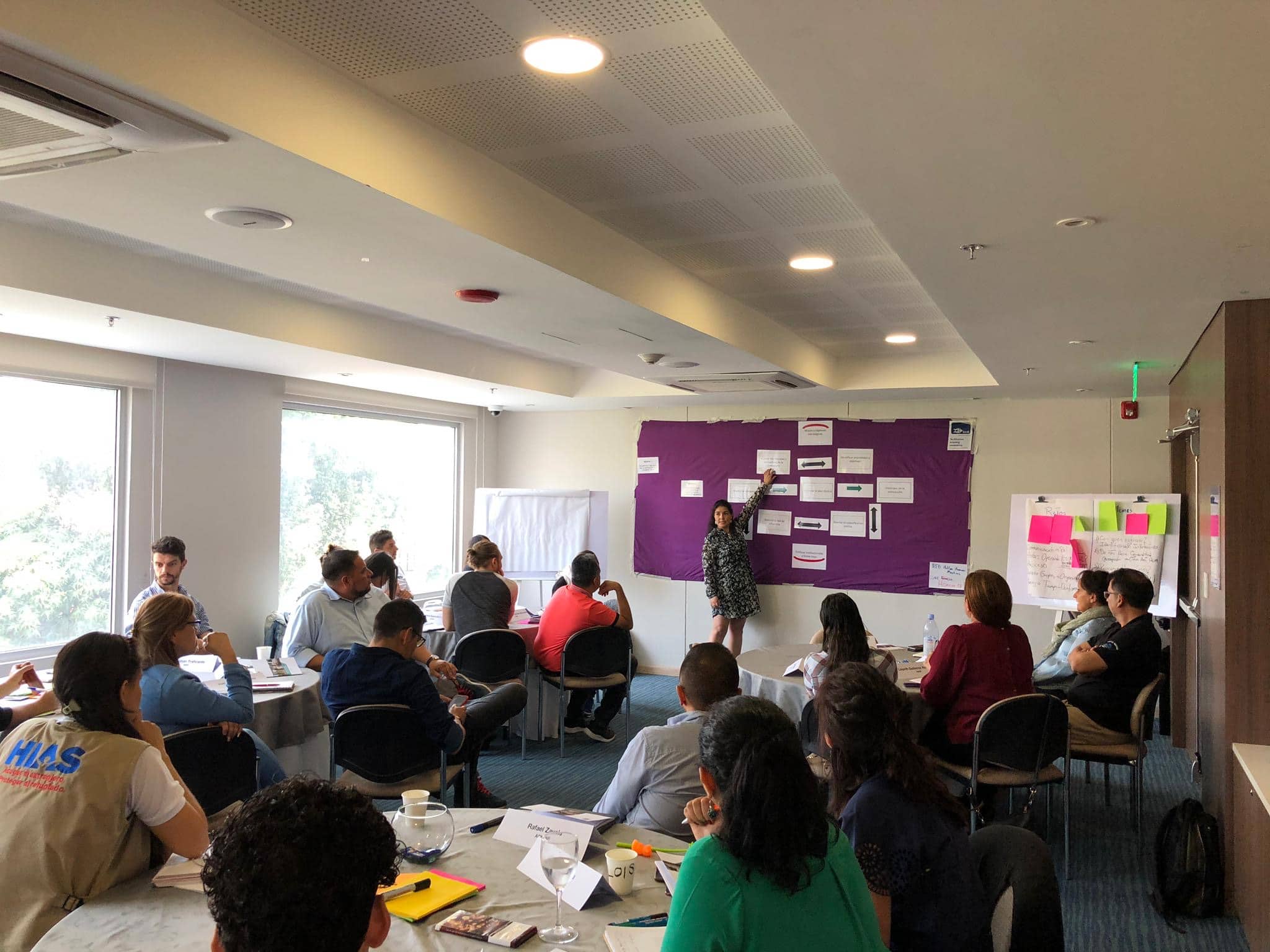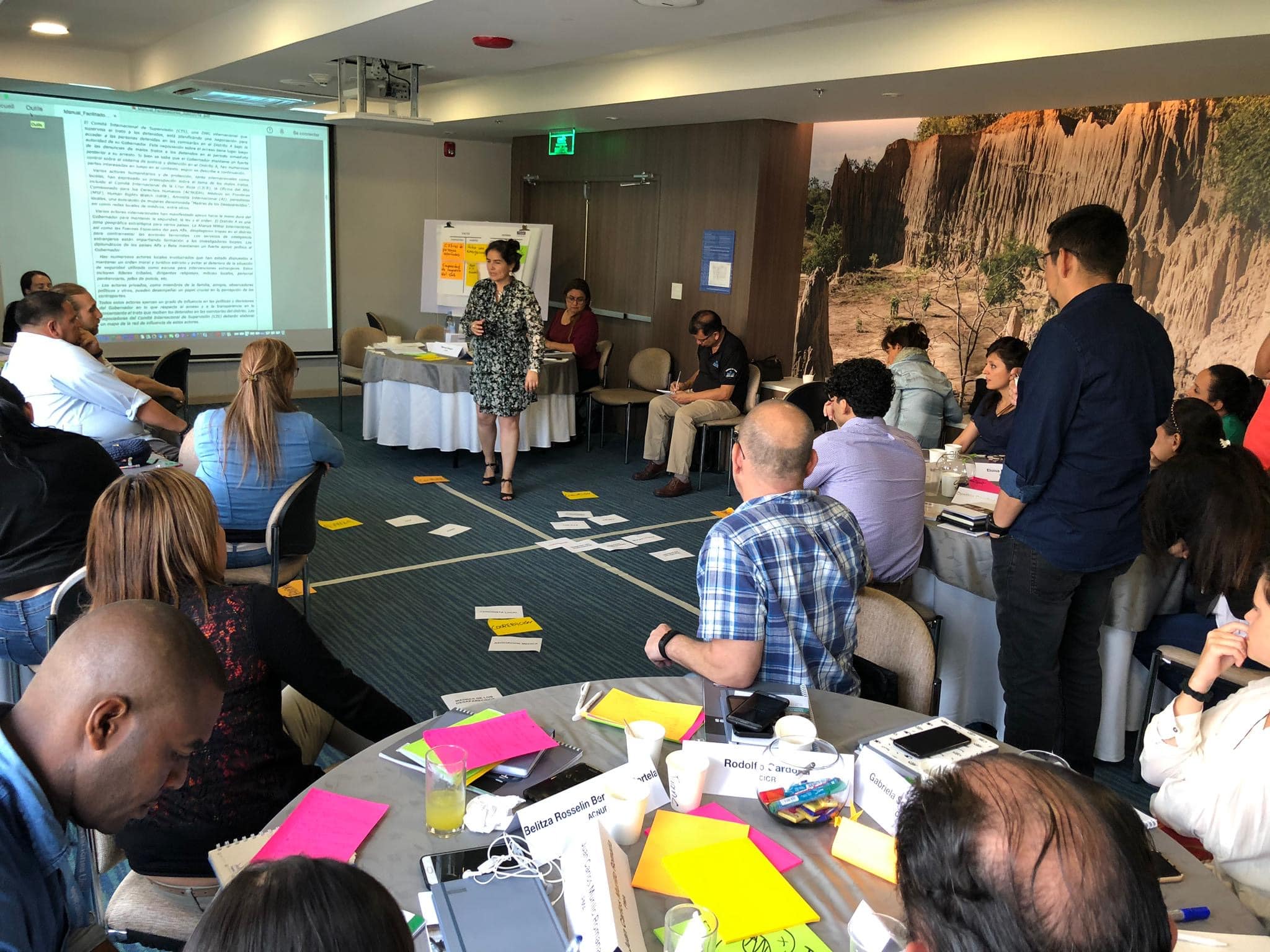
The participants were asked to figure the puzzle of the Naivasha Grid. (Photo: Nikolas Rubiato/CCHN)
In February and March 2020, the CCHN organized two Peer Workshops and a Specialized Session in Spanish to strengthen the negotiation capabilities of humanitarian workers in Latin America. The first Taller de negociación humanitaria en terreno (Peer Workshop on Humanitarian Negotiations) was held in Cucuta, Colombia on 25-27 February 2020. Following the Cucuta workshop, a second Peer Workshop and a Specialized Session took place in San Salvador, El Salvador in early March 2020.
In addition to participants from leading humanitarian organizations who are CCHN Strategic Partners, such as ICRC, UNHCR, MSF and WFP, we welcomed participants from INGOs such as NRC and HIAS (Hebrew Immigrant Aid Society).
Participants came not only from Colombia and El Salvador, but also from Brazil, Venezuela, Mexico, Panama and Honduras. This created interesting peer exchanges between people from multiple contexts and situations, yet still focused on Latin America. In addition, the good gender balance in these workshops was something that deserves recognition.
Preparation Prior to the Workshops
Before going to the on-site Peer Workshops, participants were given access to CCHN Connect where they could find the reading materials and the introduction to the sessions delivered during the workshops. Also, participants could get to know each other and start networking.
“The meeting room on CCHN Connect is a useful tool that can be used more effectively by the participants. I wished that the access could be share earlier prior to the workshops. We can generate a pre-diagnosis of the knowledge of the participants through basic questions in the assignment section,” Richard Terrazas A., Engineer, The United Nations.
“I find CCHN Connect as a very interesting platform where you can share useful information about the experiences of many colleagues around the world on issues of humanitarian negotiation. There are good materials, relevant and complete information before going to the workshop,” Diego Gutierrez, Licenciado en Administración de Empresas, WFP

Marcia Vargas, CCHN Negotiation Support Specialist – Latin America explained the negotiation steps based on the Naivasha Grid. (Photo: Nikolas Rubiato/CCHN)
A Focus on Refugees and Internally Displaced People
As the main crossing point of the border between Colombia and Venezuela, the CCHN had decided to conduct this Peer Workshop in Cucuta to enable the participation of humanitarians working in Venezuela. During the Peer Workshop, the conversations revolved around the topic of refugees and internally displaced people (IDPs) from both countries.
Marcia Vargas, CCHN Negotiation Support Specialist for Latin America said “It is a hard time for frontline negotiators in Colombia and Venezuela due to the changes of the situations of refugees and IDPs within the last two years. In Venezuela, it is more complicated due to bigger territory. Our participants had usually short time to execute their operations as the demands were high and manage relationship with donors. By exchanging experiences of practitioners from between organizations, we could find good practices on how to negotiate with different groups to deliver access and assistances for these people on the move affected by conflicts.”
The sessions delivered during the peer workshops aimed to show the application and practical aspects of the CCHN tools and methods relating to different contexts, including the ones faced by the participants.
“I would have liked a more practical or organized way to explore the negotiation from different points of view using the tools, references and reflection gained during this workshop. For example, by using the Know your Conflict Management Style tool. Many times, we act spontaneously and in reaction to the interlocutor, without thinking about us and our personality and style, which do have a great impact on the negotiation. I will think more about these aspects, not only with respect to myself but also to my colleagues,” Eloisa Miranda, Maestría en Relaciones Internacionales, ICRC

Stakeholder Mapping was one of the tools preferred by the participants to use in their daily works. (Photo: Nikolas Rubiato/CCHN)
Negotiations with Local Gangs
The focus of the Peer Workshop in San Salvador shifted to negotiation challenges humanitarians face in Other Situations of Violence.
Participants shared that many organizations are not allowed to negotiate with local gangs, which can make things more complicated and harder to find solutions.
Therefore, humanitarians try to convey messages about protecting the vulnerable populations in areas where local gangs dominate when they deliver assistance programs.
Focusing on how to prepare and plan a negotiation step-by-step, the workshop began with a session on the Naivasha Grid, the CCHN’s framework to prepare and review negotiation processes.
Marcia Vargas, CCHN Negotiation Support Specialist for Latin America explained, “As most of the participants were working in Central America, we shared our experiences more in dealing with the other situation of violence. Many organizations were not allowed to negotiate with the local gangs which made things more complicated and harder to find solutions. Therefore, the humanitarians mostly put their efforts in delivering assistance, such as water, sanitation, and education program to convey the messages about protecting the vulnerable populations due to the domination of local gangs.”
“The content is relevant and very practical for the work we do in the different contexts and based on the experiences that each participant contributes and provides a wealth of information and tools for negotiation. For me, The Naivasha Grid simplifies the complexity of the negotiation and illustrates the steps in an orderly and logical way,” Verónica Contreras, Licenciada en Educación, MSF.
Some of the participants and facilitators stayed for the Specialized Session on Humanitarian Negotiation in El Salvador. The facilitators were members of the CCHN Community of Practice who had completed the Training of Facilitators program. After the training, they can voluntarily support the CCHN team delivering the CCHN methods and tools at Peer Workshops organized by the CCHN.
The Specialized Session was based on research conducted in 2018, including 42 interviews with humanitarian professionals in El Salvador, Honduras and Panama about their experience negotiating or trying to negotiate with gangs. It provided a rich learning experience that put the stories and first-hand experiences of participants front and center.
Due to the Coronavirus, CCHN on-site activities in Latin America have been postponed until the end of August. Meanwhile, a series of online events are being organized. In particular, a Training of Facilitators program in Spanish will be the priority for CCHN operations in this region in order to expand the support of capacity building on humanitarian negotiation.
